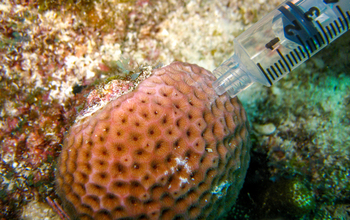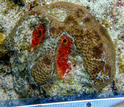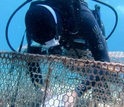
Research News
Combination of factors affecting corals’ microbiomes
June 8, 2016
The following is part 20 in a series on the National Science Foundation (NSF)’s Environmental Research and Education (ERE) programs. See parts one, two, three, four, five, six, seven, eight, nine, 10, 11, 12, 13, 14, 15, 16, 17, 18 and 19 in this series.
Coral reefs are declining around the world because a combination of factors — overfishing, nutrient pollution, and pathogenic disease — is becoming deadly when combined with higher ocean temperatures, researchers have concluded.
A study published this week in Nature Communications, based on one of the largest and longest field experiments on this topic, suggests that the widespread coral deaths observed in recent decades are being caused by a combination of multiple local stressors and global warming.
These forces greatly weaken corals and allow opportunistic pathogens to build to such levels that corals cannot survive.
“We need to know how human activities are affecting coral reef ecosystems,” said David Garrison, program director in the National Science Foundation (NSF)’s Division of Ocean Sciences, which supported the research through an NSF Dimensions of Biodiversity grant.
The Dimensions of Biodiversity program is co-funded by NSF’s Division of Ocean Sciences and Division of Environmental Biology.
“Coral reefs are among the most sensitive indicators of the health of the oceans,” Garrison said. “This report is a major contribution toward understanding how reefs will fare in the future.”
Long-term experiment, new findings
Researchers from six institutions made the findings following a three-year experiment that simulated both overfishing and nutrient pollution on a coral reef in the Florida Keys.
The large body of field data collected over an extended period helped resolve some of the questions about coral reef declines, the scientists said.
“This is grim news, but at least it will help settle the argument over why corals are dying,” said Rebecca Vega-Thurber, a marine ecologist at Oregon State University and corresponding author on the study.
“It’s clear there’s no single force causing widespread coral deaths,” Vega-Thurber said. “Loss of fish that help remove algae, or the addition of excess nutrients like those in fertilizers, can cause algal growth on reefs. That changes the normal microbiota of corals to become more pathogenic, and all these problems reach critical levels as ocean temperatures warm.”
Global decline of catastrophic proportions
The end result, scientists say, is a global decline of coral reefs that’s currently reaching catastrophic proportions.
The problems caused by bacterial infections due to local stressors and warm temperatures come in addition to damage already done to reefs by mass coral bleaching events.
“This research highlights the importance of microbial communities in all aspects of coral development and growth, from resistance to overfishing, disease and pollution, to helping corals buffer against the effects of climate change,” said Simon Malcomber, Dimensions of Biodiversity program director in NSF’s Division of Environmental Biology.
“Only by considering both the corals and their resident microbial communities can we hope to come up with a long-term sustainability plan for these diverse and essential marine ecosystems.”
In the early 1980s, researchers observed the first mass bleaching event in recorded history. There have now been three such events in the past 20 years.
“About 25-35 percent of the corals on Australia’s Great Barrier Reef are dying right now,” Vega-Thurber said. “In 2014-16, large portions of tropical reefs across the planet experienced bleaching, and this past April, 90 percent of the Great Barrier Reef bleached as part of a massive El Nino event.
“Corals everywhere seem to be dying.”
Parrotfish on reefs: Good and bad news
In addition to helping sort out the effects of known stressors like overfishing and nutrient pollution, researchers in the study made one unexpected finding.
In normal conditions, parrotfish, like many other species, are essential to the health of coral reefs, nibbling at them to remove algae and causing no permanent damage.
But corals in one part of the experiment were so weakened by nitrogen and phosphorus pollution that when parrotfish bit them, 62 percent of the corals died. A normally healthy fish-coral interaction had turned into a deadly one.
“We want to make clear that parrotfish are not the problem, they are a normal and essential part of healthy reef ecosystems,” Vega-Thurber said. “The problem comes when corals are so weakened they cannot withstand normal impacts. And the solution is to help those corals recover their health, by ensuring that their local environment is free of nutrient pollution and that fish stocks are not depleted.”
Key study findings
Among the study’s findings:
- Overfishing, nutrient pollution and increased temperature all lead to an increase in pathogens.
- The abundance of pathogens is more important than what particular type or species they are.
- Coral reef mortality mirrors the abundance of pathogens.
- Heat exacerbates these problems, with 80 percent of coral deaths coming in the summer or fall, but only when algae-eating fish are removed or nutrient pollution is present.
- While high thermal stress has received the most attention, even modest temperature increases make corals more vulnerable to bacteria.
- Loss of fish can increase algae cover up to six times.
- In a distressed system with many algae, coral disease levels double and coral mortality increases by eight times.
- Increased algae cover or higher temperatures can reduce levels of naturally secreted antibiotics that help protect corals from harmful bacteria.
- Direct algae contact driven by overfishing and nutrient pollution destabilizes corals’ microbiomes, in some cases leading to a 6-to-9 times increase in mortality.
Careful management needed
The findings, the researchers say, make clear that in the face of global warming, the best opportunities to protect coral reefs reside in careful management of fishing and protection of water quality. That would give corals their best chance of maintaining healthy microbiomes and resisting warmer conditions, scientists say.
Collaborators on the research are affiliated with Florida International University, the University of California Santa Barbara, Penn State University, Rice University, the University of Florida at Gainesville, SymbioSeas and Marine Applied Research Center, and the Laboratoire d’Excellence.
—
Cheryl Dybas,
NSF
(703) 292-7734 cdybas@nsf.gov
—
David Stauth,
OSU
(541) 737-0787 david.stauth@oregonstate.edu
-
Scientists Rebecca Vega-Thurber, Ryan McMinds and Jerome Payet check on experimental coral plots.
Credit and Larger Version -
Coral in the nutrient-enriched plot is suffering from a disease called Dark Spot Syndrome.
Credit and Larger Version -
Coral and algae together: an increasingly common situation.
Credit and Larger Version -
Marine biologist Deron Burkepile takes notes on bottom-dwelling species in an herbivore exclosure.
Credit and Larger Version -
A parrotfish about to bite a coral. Scientists found good and bad news about corals and parrotfish.
Credit and Larger Version -
Divers assess algae cover on corals in plots at experimental site.
Credit and Larger Version
Investigators
Rebecca Vega
Deron Burkepile
Rebecca Vega-Thurber
Related Institutions/Organizations
Oregon State University
Florida International University
Related Programs
Dimensions of Biodiversity
Related Awards
#1442306 Collaborative Research: Dimensions: Coevolution of scleractinian corals and their associated microorganisms
#1130786 Cascading interactions of herbivore loss and nutrient enrichment on coral reef macroalgae, corals, and microbial dynamics
Total Grants
$1,946,062
Source: NSF News
Brought to you by China News













